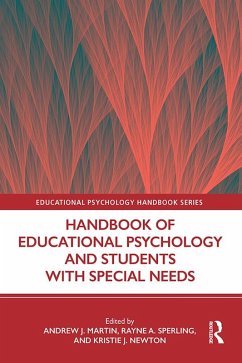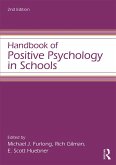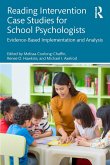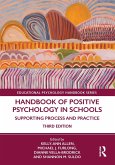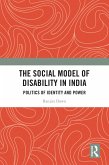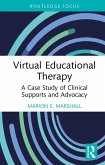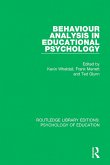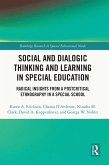Handbook of Educational Psychology and Students with Special Needs (eBook, PDF)
Redaktion: Martin, Andrew J.; Newton, Kristie J.; Sperling, Rayne A.
115,95 €
115,95 €
inkl. MwSt.
Sofort per Download lieferbar

58 °P sammeln
115,95 €
Als Download kaufen

115,95 €
inkl. MwSt.
Sofort per Download lieferbar

58 °P sammeln
Jetzt verschenken
Alle Infos zum eBook verschenken
115,95 €
inkl. MwSt.
Sofort per Download lieferbar
Alle Infos zum eBook verschenken

58 °P sammeln
Handbook of Educational Psychology and Students with Special Needs (eBook, PDF)
Redaktion: Martin, Andrew J.; Newton, Kristie J.; Sperling, Rayne A.
- Format: PDF
- Merkliste
- Auf die Merkliste
- Bewerten Bewerten
- Teilen
- Produkt teilen
- Produkterinnerung
- Produkterinnerung

Bitte loggen Sie sich zunächst in Ihr Kundenkonto ein oder registrieren Sie sich bei
bücher.de, um das eBook-Abo tolino select nutzen zu können.
Hier können Sie sich einloggen
Hier können Sie sich einloggen
Sie sind bereits eingeloggt. Klicken Sie auf 2. tolino select Abo, um fortzufahren.

Bitte loggen Sie sich zunächst in Ihr Kundenkonto ein oder registrieren Sie sich bei bücher.de, um das eBook-Abo tolino select nutzen zu können.
Handbook of Educational Psychology and Students with Special Needs provides educational and psychological stakeholders with critical domain-specific expertise on the factors and processes relevant to learning for students with special needs.
- Geräte: PC
- ohne Kopierschutz
- eBook Hilfe
- Größe: 6.8MB
Andere Kunden interessierten sich auch für
![Handbook of Positive Psychology in Schools (eBook, PDF) Handbook of Positive Psychology in Schools (eBook, PDF)]() Handbook of Positive Psychology in Schools (eBook, PDF)125,95 €
Handbook of Positive Psychology in Schools (eBook, PDF)125,95 €![Reading Intervention Case Studies for School Psychologists (eBook, PDF) Reading Intervention Case Studies for School Psychologists (eBook, PDF)]() Reading Intervention Case Studies for School Psychologists (eBook, PDF)43,95 €
Reading Intervention Case Studies for School Psychologists (eBook, PDF)43,95 €![Handbook of Positive Psychology in Schools (eBook, PDF) Handbook of Positive Psychology in Schools (eBook, PDF)]() Handbook of Positive Psychology in Schools (eBook, PDF)104,95 €
Handbook of Positive Psychology in Schools (eBook, PDF)104,95 €![The Social Model of Disability in India (eBook, PDF) The Social Model of Disability in India (eBook, PDF)]() Ranjita DawnThe Social Model of Disability in India (eBook, PDF)43,95 €
Ranjita DawnThe Social Model of Disability in India (eBook, PDF)43,95 €![Virtual Educational Therapy (eBook, PDF) Virtual Educational Therapy (eBook, PDF)]() Marion E. MarshallVirtual Educational Therapy (eBook, PDF)20,95 €
Marion E. MarshallVirtual Educational Therapy (eBook, PDF)20,95 €![Behaviour Analysis in Educational Psychology (eBook, PDF) Behaviour Analysis in Educational Psychology (eBook, PDF)]() Behaviour Analysis in Educational Psychology (eBook, PDF)40,95 €
Behaviour Analysis in Educational Psychology (eBook, PDF)40,95 €![Social and Dialogic Thinking and Learning in Special Education (eBook, PDF) Social and Dialogic Thinking and Learning in Special Education (eBook, PDF)]() Karen A. EricksonSocial and Dialogic Thinking and Learning in Special Education (eBook, PDF)42,95 €
Karen A. EricksonSocial and Dialogic Thinking and Learning in Special Education (eBook, PDF)42,95 €-
-
-
Handbook of Educational Psychology and Students with Special Needs provides educational and psychological stakeholders with critical domain-specific expertise on the factors and processes relevant to learning for students with special needs.
Dieser Download kann aus rechtlichen Gründen nur mit Rechnungsadresse in A, B, BG, CY, CZ, D, DK, EW, E, FIN, F, GR, HR, H, IRL, I, LT, L, LR, M, NL, PL, P, R, S, SLO, SK ausgeliefert werden.
Produktdetails
- Produktdetails
- Verlag: Taylor & Francis eBooks
- Seitenzahl: 742
- Erscheinungstermin: 18. Februar 2020
- Englisch
- ISBN-13: 9781351586757
- Artikelnr.: 58680805
- Verlag: Taylor & Francis eBooks
- Seitenzahl: 742
- Erscheinungstermin: 18. Februar 2020
- Englisch
- ISBN-13: 9781351586757
- Artikelnr.: 58680805
- Herstellerkennzeichnung Die Herstellerinformationen sind derzeit nicht verfügbar.
Andrew J. Martin is Scientia Professor, Professor of Educational Psychology, and Co-Chair of the Educational Psychology Research Group in the School of Education at the University of New South Wales, Australia. Rayne A. Sperling is Professor and Associate Dean in the College of Education at Pennsylvania State Unviersity, USA. Kristie J. Newton is Associate Professor in the Department of Teaching and Learning at Temple University, USA.
Contents
Acknowledgments
Ch 1
Introduction: Educational Psychology and Students with Special Needs
Andrew J. Martin, Kristie J. Newton, Rayne A. Sperling
SECTION 1: Special Needs and Educational Psychology
Section Introduction: Students with Special Needs and Educational Psychology
Rayne A. Sperling
Ch 2
Specific Learning Disabilities as a Working Memory Deficit: A Model Revisited
H. Lee Swanson
Ch 3
Identifying and Supporting Students with Affective Disorders in Schools: Academic Anxieties and Emotional Information Processing
Jerrell C. Cassady and Christopher L. Thomas
Ch 4
The Importance of Self-determination and Inclusion for Students with Intellectual Disability: What We Know and What We Still Need to Discover
Iva Strnadova
Ch 5
The Roles of Executive Functions in Learning and Achievement
D. Jake Follmer and Rayne A. Sperling
Ch 6
Language impairments: Challenges and opportunities for meeting children's needs and insights from psycho-educational theory and research
Julie E. Dockrell and Geoff Lindsay
Ch 7
Understanding the Development and Instruction of Reading for English Learners with Learning Disabilities
Colby Hall, Philip Capin, Sharon Vaughn, and Grace Cannon
Ch 8
Developmental Disability
Jeff Sigafoos, Vanessa A. Green, Mark F. O'Reilly, and Giulio E. Lancioni
Ch 9
Child Maltreatment: Pathways to Educational Achievement Through Self-Regulation and Self-Regulated Learning
Carlomagno C. Panlilio and Catherine Corr
Ch 10
Behavioral Disorder: Theory, Research, and Practice
Ming Tak Hue
SECTION 2: Perspectives from Major Educational Psychology Theories
Section Introduction: Perspectives on Special Needs from Major Educational Psychology Theories
Andrew J. Martin
Ch 11
Social Cognitive Theory, Self-Efficacy, and Students with Disabilities: Implications for Students with Learning Disabilities, Reading Disabilities, and Attention-Deficit/Hyperactivity Disorder (ADHD)
Dale H. Schunk and Maria K. DiBenedetto
Ch 12
Self-Determination and Autonomous Motivation: Implications for Students with Intellectual, Developmental, and Specific Learning Disabilities
Michael L. Wehmeyer and Karrie A. Shogren
Ch 13
Using Self-Regulated Learning to Support Students with Learning Disabilities in Classrooms
Nancy E. Perry, Silvia Mazabel, and Nikki Yee
Ch 14
Goal Concepts for Understanding and Improving the Performance of Students with Learning Disabilities
David A. Bergin and Sara L. Prewett
Ch 15
Using Cognitive Load Theory to Improve Text Comprehension for Students with Dyslexia
André Tricot, Geneviève Vandenbroucke, John Sweller
Ch 16
Self-worth Theory and Students with Attention-Deficit/Hyperactivity Disorder (ADHD)
Andrew J. Martin
Ch 17
The Relevance of Expectancy-Value Theory to Understanding the Motivation and Achievement of Students with Cognitive and Emotional Special Needs: Focus on Depression and Anxiety
Allan Wigfield and Annette Ponnock
Ch 18
Control-Value Theory and Students with Special Needs: Achievement Emotion Disorders and their Links to Behavioral Disorders and Academic Difficulties
Reinhard Pekrun and Kristina Loderer
SECTION 3: Special Needs and Constructs Relevant to Psycho-Educational Development
Section Introduction: Special Needs and Constructs Relevant to Psycho-Educational Development
Kristie J. Newton
Ch 19
Improving Learning in Students with Mathematics Difficulties: Contributions from the Science of Learning
Nancy C. Jordan, Christina Barbieri, Nancy Dyson, and Brianna Devlin
Ch 20
Writing and Students with Learning Disabilities
Steve Graham and Karen R. Harris
Ch 21
Reasoning Skills in Individuals with Mathematics Difficulties
Kinga Morsanyi
Ch 22
Interpersonal Relationships and Students with Autism Spectrum Disorder (ASD): Perspectives from Theory of Mind and Neuroscience
Robyn M. Gillies
Ch 23
Student Engagement and Learning, Attention, Behavioral, and Emotional Difficulties in School
Kayleigh C. O'Donnell and Amy L. Reschly
Ch 24
Examining Academic Self-Concepts and the Big-Fish-Little-Pond Effect in Relation to Inclusive and Segregated Classroom Environments for Students with Mild Intellectual Disabilities
Danielle Tracey, Dafna Merom, Alexandre J. S. Morin, and Christophe Maïano
Ch 25
Cultural and Sociocultural Influences and Learners with Special Needs
Angus Macfarlane, Sonja Macfarlane, and Helen Mataiti
Ch 26
Technology and Its Impact on Reading for Students with Learning Disabilities
Cynthia M. Okolo and Ralph Ferretti
Ch 27
The Relevance of Neuroscience to Understanding Achievement in Special Needs Children
James P. Byrnes and Jennifer Taylor Eaton
Ch 28
Conclusion: Future Directions in the Application of Educational Psychology to Students with Special Needs
Andrew J. Martin, Kristie J. Newton, and Rayne A. Sperling
Contributor Bios
Acknowledgments
Ch 1
Introduction: Educational Psychology and Students with Special Needs
Andrew J. Martin, Kristie J. Newton, Rayne A. Sperling
SECTION 1: Special Needs and Educational Psychology
Section Introduction: Students with Special Needs and Educational Psychology
Rayne A. Sperling
Ch 2
Specific Learning Disabilities as a Working Memory Deficit: A Model Revisited
H. Lee Swanson
Ch 3
Identifying and Supporting Students with Affective Disorders in Schools: Academic Anxieties and Emotional Information Processing
Jerrell C. Cassady and Christopher L. Thomas
Ch 4
The Importance of Self-determination and Inclusion for Students with Intellectual Disability: What We Know and What We Still Need to Discover
Iva Strnadova
Ch 5
The Roles of Executive Functions in Learning and Achievement
D. Jake Follmer and Rayne A. Sperling
Ch 6
Language impairments: Challenges and opportunities for meeting children's needs and insights from psycho-educational theory and research
Julie E. Dockrell and Geoff Lindsay
Ch 7
Understanding the Development and Instruction of Reading for English Learners with Learning Disabilities
Colby Hall, Philip Capin, Sharon Vaughn, and Grace Cannon
Ch 8
Developmental Disability
Jeff Sigafoos, Vanessa A. Green, Mark F. O'Reilly, and Giulio E. Lancioni
Ch 9
Child Maltreatment: Pathways to Educational Achievement Through Self-Regulation and Self-Regulated Learning
Carlomagno C. Panlilio and Catherine Corr
Ch 10
Behavioral Disorder: Theory, Research, and Practice
Ming Tak Hue
SECTION 2: Perspectives from Major Educational Psychology Theories
Section Introduction: Perspectives on Special Needs from Major Educational Psychology Theories
Andrew J. Martin
Ch 11
Social Cognitive Theory, Self-Efficacy, and Students with Disabilities: Implications for Students with Learning Disabilities, Reading Disabilities, and Attention-Deficit/Hyperactivity Disorder (ADHD)
Dale H. Schunk and Maria K. DiBenedetto
Ch 12
Self-Determination and Autonomous Motivation: Implications for Students with Intellectual, Developmental, and Specific Learning Disabilities
Michael L. Wehmeyer and Karrie A. Shogren
Ch 13
Using Self-Regulated Learning to Support Students with Learning Disabilities in Classrooms
Nancy E. Perry, Silvia Mazabel, and Nikki Yee
Ch 14
Goal Concepts for Understanding and Improving the Performance of Students with Learning Disabilities
David A. Bergin and Sara L. Prewett
Ch 15
Using Cognitive Load Theory to Improve Text Comprehension for Students with Dyslexia
André Tricot, Geneviève Vandenbroucke, John Sweller
Ch 16
Self-worth Theory and Students with Attention-Deficit/Hyperactivity Disorder (ADHD)
Andrew J. Martin
Ch 17
The Relevance of Expectancy-Value Theory to Understanding the Motivation and Achievement of Students with Cognitive and Emotional Special Needs: Focus on Depression and Anxiety
Allan Wigfield and Annette Ponnock
Ch 18
Control-Value Theory and Students with Special Needs: Achievement Emotion Disorders and their Links to Behavioral Disorders and Academic Difficulties
Reinhard Pekrun and Kristina Loderer
SECTION 3: Special Needs and Constructs Relevant to Psycho-Educational Development
Section Introduction: Special Needs and Constructs Relevant to Psycho-Educational Development
Kristie J. Newton
Ch 19
Improving Learning in Students with Mathematics Difficulties: Contributions from the Science of Learning
Nancy C. Jordan, Christina Barbieri, Nancy Dyson, and Brianna Devlin
Ch 20
Writing and Students with Learning Disabilities
Steve Graham and Karen R. Harris
Ch 21
Reasoning Skills in Individuals with Mathematics Difficulties
Kinga Morsanyi
Ch 22
Interpersonal Relationships and Students with Autism Spectrum Disorder (ASD): Perspectives from Theory of Mind and Neuroscience
Robyn M. Gillies
Ch 23
Student Engagement and Learning, Attention, Behavioral, and Emotional Difficulties in School
Kayleigh C. O'Donnell and Amy L. Reschly
Ch 24
Examining Academic Self-Concepts and the Big-Fish-Little-Pond Effect in Relation to Inclusive and Segregated Classroom Environments for Students with Mild Intellectual Disabilities
Danielle Tracey, Dafna Merom, Alexandre J. S. Morin, and Christophe Maïano
Ch 25
Cultural and Sociocultural Influences and Learners with Special Needs
Angus Macfarlane, Sonja Macfarlane, and Helen Mataiti
Ch 26
Technology and Its Impact on Reading for Students with Learning Disabilities
Cynthia M. Okolo and Ralph Ferretti
Ch 27
The Relevance of Neuroscience to Understanding Achievement in Special Needs Children
James P. Byrnes and Jennifer Taylor Eaton
Ch 28
Conclusion: Future Directions in the Application of Educational Psychology to Students with Special Needs
Andrew J. Martin, Kristie J. Newton, and Rayne A. Sperling
Contributor Bios
Contents
Acknowledgments
Ch 1
Introduction: Educational Psychology and Students with Special Needs
Andrew J. Martin, Kristie J. Newton, Rayne A. Sperling
SECTION 1: Special Needs and Educational Psychology
Section Introduction: Students with Special Needs and Educational Psychology
Rayne A. Sperling
Ch 2
Specific Learning Disabilities as a Working Memory Deficit: A Model Revisited
H. Lee Swanson
Ch 3
Identifying and Supporting Students with Affective Disorders in Schools: Academic Anxieties and Emotional Information Processing
Jerrell C. Cassady and Christopher L. Thomas
Ch 4
The Importance of Self-determination and Inclusion for Students with Intellectual Disability: What We Know and What We Still Need to Discover
Iva Strnadova
Ch 5
The Roles of Executive Functions in Learning and Achievement
D. Jake Follmer and Rayne A. Sperling
Ch 6
Language impairments: Challenges and opportunities for meeting children's needs and insights from psycho-educational theory and research
Julie E. Dockrell and Geoff Lindsay
Ch 7
Understanding the Development and Instruction of Reading for English Learners with Learning Disabilities
Colby Hall, Philip Capin, Sharon Vaughn, and Grace Cannon
Ch 8
Developmental Disability
Jeff Sigafoos, Vanessa A. Green, Mark F. O'Reilly, and Giulio E. Lancioni
Ch 9
Child Maltreatment: Pathways to Educational Achievement Through Self-Regulation and Self-Regulated Learning
Carlomagno C. Panlilio and Catherine Corr
Ch 10
Behavioral Disorder: Theory, Research, and Practice
Ming Tak Hue
SECTION 2: Perspectives from Major Educational Psychology Theories
Section Introduction: Perspectives on Special Needs from Major Educational Psychology Theories
Andrew J. Martin
Ch 11
Social Cognitive Theory, Self-Efficacy, and Students with Disabilities: Implications for Students with Learning Disabilities, Reading Disabilities, and Attention-Deficit/Hyperactivity Disorder (ADHD)
Dale H. Schunk and Maria K. DiBenedetto
Ch 12
Self-Determination and Autonomous Motivation: Implications for Students with Intellectual, Developmental, and Specific Learning Disabilities
Michael L. Wehmeyer and Karrie A. Shogren
Ch 13
Using Self-Regulated Learning to Support Students with Learning Disabilities in Classrooms
Nancy E. Perry, Silvia Mazabel, and Nikki Yee
Ch 14
Goal Concepts for Understanding and Improving the Performance of Students with Learning Disabilities
David A. Bergin and Sara L. Prewett
Ch 15
Using Cognitive Load Theory to Improve Text Comprehension for Students with Dyslexia
André Tricot, Geneviève Vandenbroucke, John Sweller
Ch 16
Self-worth Theory and Students with Attention-Deficit/Hyperactivity Disorder (ADHD)
Andrew J. Martin
Ch 17
The Relevance of Expectancy-Value Theory to Understanding the Motivation and Achievement of Students with Cognitive and Emotional Special Needs: Focus on Depression and Anxiety
Allan Wigfield and Annette Ponnock
Ch 18
Control-Value Theory and Students with Special Needs: Achievement Emotion Disorders and their Links to Behavioral Disorders and Academic Difficulties
Reinhard Pekrun and Kristina Loderer
SECTION 3: Special Needs and Constructs Relevant to Psycho-Educational Development
Section Introduction: Special Needs and Constructs Relevant to Psycho-Educational Development
Kristie J. Newton
Ch 19
Improving Learning in Students with Mathematics Difficulties: Contributions from the Science of Learning
Nancy C. Jordan, Christina Barbieri, Nancy Dyson, and Brianna Devlin
Ch 20
Writing and Students with Learning Disabilities
Steve Graham and Karen R. Harris
Ch 21
Reasoning Skills in Individuals with Mathematics Difficulties
Kinga Morsanyi
Ch 22
Interpersonal Relationships and Students with Autism Spectrum Disorder (ASD): Perspectives from Theory of Mind and Neuroscience
Robyn M. Gillies
Ch 23
Student Engagement and Learning, Attention, Behavioral, and Emotional Difficulties in School
Kayleigh C. O'Donnell and Amy L. Reschly
Ch 24
Examining Academic Self-Concepts and the Big-Fish-Little-Pond Effect in Relation to Inclusive and Segregated Classroom Environments for Students with Mild Intellectual Disabilities
Danielle Tracey, Dafna Merom, Alexandre J. S. Morin, and Christophe Maïano
Ch 25
Cultural and Sociocultural Influences and Learners with Special Needs
Angus Macfarlane, Sonja Macfarlane, and Helen Mataiti
Ch 26
Technology and Its Impact on Reading for Students with Learning Disabilities
Cynthia M. Okolo and Ralph Ferretti
Ch 27
The Relevance of Neuroscience to Understanding Achievement in Special Needs Children
James P. Byrnes and Jennifer Taylor Eaton
Ch 28
Conclusion: Future Directions in the Application of Educational Psychology to Students with Special Needs
Andrew J. Martin, Kristie J. Newton, and Rayne A. Sperling
Contributor Bios
Acknowledgments
Ch 1
Introduction: Educational Psychology and Students with Special Needs
Andrew J. Martin, Kristie J. Newton, Rayne A. Sperling
SECTION 1: Special Needs and Educational Psychology
Section Introduction: Students with Special Needs and Educational Psychology
Rayne A. Sperling
Ch 2
Specific Learning Disabilities as a Working Memory Deficit: A Model Revisited
H. Lee Swanson
Ch 3
Identifying and Supporting Students with Affective Disorders in Schools: Academic Anxieties and Emotional Information Processing
Jerrell C. Cassady and Christopher L. Thomas
Ch 4
The Importance of Self-determination and Inclusion for Students with Intellectual Disability: What We Know and What We Still Need to Discover
Iva Strnadova
Ch 5
The Roles of Executive Functions in Learning and Achievement
D. Jake Follmer and Rayne A. Sperling
Ch 6
Language impairments: Challenges and opportunities for meeting children's needs and insights from psycho-educational theory and research
Julie E. Dockrell and Geoff Lindsay
Ch 7
Understanding the Development and Instruction of Reading for English Learners with Learning Disabilities
Colby Hall, Philip Capin, Sharon Vaughn, and Grace Cannon
Ch 8
Developmental Disability
Jeff Sigafoos, Vanessa A. Green, Mark F. O'Reilly, and Giulio E. Lancioni
Ch 9
Child Maltreatment: Pathways to Educational Achievement Through Self-Regulation and Self-Regulated Learning
Carlomagno C. Panlilio and Catherine Corr
Ch 10
Behavioral Disorder: Theory, Research, and Practice
Ming Tak Hue
SECTION 2: Perspectives from Major Educational Psychology Theories
Section Introduction: Perspectives on Special Needs from Major Educational Psychology Theories
Andrew J. Martin
Ch 11
Social Cognitive Theory, Self-Efficacy, and Students with Disabilities: Implications for Students with Learning Disabilities, Reading Disabilities, and Attention-Deficit/Hyperactivity Disorder (ADHD)
Dale H. Schunk and Maria K. DiBenedetto
Ch 12
Self-Determination and Autonomous Motivation: Implications for Students with Intellectual, Developmental, and Specific Learning Disabilities
Michael L. Wehmeyer and Karrie A. Shogren
Ch 13
Using Self-Regulated Learning to Support Students with Learning Disabilities in Classrooms
Nancy E. Perry, Silvia Mazabel, and Nikki Yee
Ch 14
Goal Concepts for Understanding and Improving the Performance of Students with Learning Disabilities
David A. Bergin and Sara L. Prewett
Ch 15
Using Cognitive Load Theory to Improve Text Comprehension for Students with Dyslexia
André Tricot, Geneviève Vandenbroucke, John Sweller
Ch 16
Self-worth Theory and Students with Attention-Deficit/Hyperactivity Disorder (ADHD)
Andrew J. Martin
Ch 17
The Relevance of Expectancy-Value Theory to Understanding the Motivation and Achievement of Students with Cognitive and Emotional Special Needs: Focus on Depression and Anxiety
Allan Wigfield and Annette Ponnock
Ch 18
Control-Value Theory and Students with Special Needs: Achievement Emotion Disorders and their Links to Behavioral Disorders and Academic Difficulties
Reinhard Pekrun and Kristina Loderer
SECTION 3: Special Needs and Constructs Relevant to Psycho-Educational Development
Section Introduction: Special Needs and Constructs Relevant to Psycho-Educational Development
Kristie J. Newton
Ch 19
Improving Learning in Students with Mathematics Difficulties: Contributions from the Science of Learning
Nancy C. Jordan, Christina Barbieri, Nancy Dyson, and Brianna Devlin
Ch 20
Writing and Students with Learning Disabilities
Steve Graham and Karen R. Harris
Ch 21
Reasoning Skills in Individuals with Mathematics Difficulties
Kinga Morsanyi
Ch 22
Interpersonal Relationships and Students with Autism Spectrum Disorder (ASD): Perspectives from Theory of Mind and Neuroscience
Robyn M. Gillies
Ch 23
Student Engagement and Learning, Attention, Behavioral, and Emotional Difficulties in School
Kayleigh C. O'Donnell and Amy L. Reschly
Ch 24
Examining Academic Self-Concepts and the Big-Fish-Little-Pond Effect in Relation to Inclusive and Segregated Classroom Environments for Students with Mild Intellectual Disabilities
Danielle Tracey, Dafna Merom, Alexandre J. S. Morin, and Christophe Maïano
Ch 25
Cultural and Sociocultural Influences and Learners with Special Needs
Angus Macfarlane, Sonja Macfarlane, and Helen Mataiti
Ch 26
Technology and Its Impact on Reading for Students with Learning Disabilities
Cynthia M. Okolo and Ralph Ferretti
Ch 27
The Relevance of Neuroscience to Understanding Achievement in Special Needs Children
James P. Byrnes and Jennifer Taylor Eaton
Ch 28
Conclusion: Future Directions in the Application of Educational Psychology to Students with Special Needs
Andrew J. Martin, Kristie J. Newton, and Rayne A. Sperling
Contributor Bios
